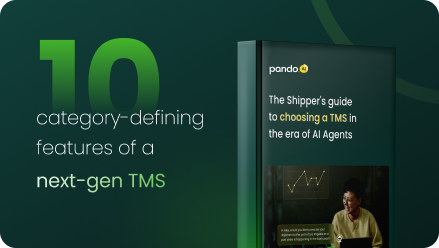The Netherlands’ Largest Supermarket Chain Cuts Freight Audit Cycle From 15 Days to 5
Transforming the Netherlands’ most complex supermarket freight operation from a failing legacy TMS to Pi, eliminating manual invoice processing across 20,000 weekly shipments.

20000
Weekly shipments processed in 5-day cycles
$2.3 Million+
annual savings from accurate cost allocation
100 %
elimination of manual invoice verification processes
Complete automation of our freight audit process!
Our TMS was built for a different era. When you're processing €28 million in monthly freight invoices across 1,100 stores, you can't afford 15-day payment cycles, especially while handling perishable and fast-moving goods via manual rate management. Pando gave us the intelligent automation we desperately needed.
VP
Transportation & Logistics
Challenge vs Benefits
Pre-Pando challenges
- 15-day freight invoice cycles were straining carrier relationships
- Manual rate management consuming 40+ hours weekly per analyst
- Legacy TMS system failures causing complete payment processing halts
- Freight cost misallocation distorting store P&L by €2M annually
- Zero automated recovery claims despite obvious billing discrepancies
Post-Pando Benefits
- Guaranteed 5-day freight audit and payment cycles improved carrier relationships significantly
- Automated rate management reducing analyst workload by 85%
- Zero system downtime with contextual AI freight audit & pay agent
- 100% Accurate freight allocation enabling accurate store profitability analysis
- Automated recovery of 80+ billing discrepancies weekly

A leading Netherlands based grocery retailer with over 1,100 stores and 110,000 employees across the Netherlands and Belgium. With 36% market share in their primary market, they manage an extensive supply chain network handling approximately 20,000+ shipments weekly through 31 carriers, with an annual freight spend of €250 million.
Industry
Retail
Region
Europe
Solutions used:
- AI freight audit & pay specialist
Legacy TMS’ 15-day freight audit cycle was killing business
The grocery giant's freight operation efficiency was going down due to a conventional TMS' inability to handle their scale. Processing 20,000 weekly shipments through incumbent TMS had become a nightmare of system crashes, manual workarounds, and payment delays that were straining relationships with their 31 carriers. The 15-day freight audit cycle meant carriers weren't getting paid until two weeks after delivery, forcing them to demand higher rates to compensate for cash flow delays
Rate management was consuming massive resources, with freight analysts spending 40+ hours weekly updating carrier contracts manually across disconnected systems. When fuel surcharges changed or carriers adjusted base rates, teams needed 3-4 days just to update one contract across their system and their supplementary spreadsheets. With rates changing constantly in the volatile European freight market, this lag meant they were consistently paying outdated rates—either overpaying carriers or creating disputes when underpayments were discovered during monthly reconciliations.
The existing solution’s frequent system failures were creating complete payment processing halts. During peak shipping periods, the system would crash for hours, leaving finance teams unable to process any freight invoices. These outages forced manual invoice reconstruction, adding days to an already slow process and creating backlogs that took weeks to clear. The lack of cloud capability meant they couldn't scale processing power during high-volume periods, creating predictable bottlenecks every month.
The freight cost allocation nightmare was distorting their entire business. The current system’s primitive GL mapping meant freight costs were being incorrectly assigned across their 1,100+ stores, creating approximately €2 million in annual misallocation. Some profitable stores appeared unprofitable due to incorrect freight charges, while truly underperforming locations looked healthy. Regional managers couldn't make informed decisions about store operations, supplier relationships, or delivery optimization because their cost data was fundamentally wrong.
We had freight analysts working weekends just to keep up with rate updates. Legacy TMS was supposed to automate freight management, but we were doing more manual work than ever before. Something had to change.
- Director of Freight Operations
How AI freight audit & pay specialist Pi delivered 5-day freight audit cycles from 15 days
End-to-end freight audit processing in autopilot
Pi, Pando's freight audit and pay specialist, eliminated the 15-day audit to payment delays that were damaging carrier relationships by creating guaranteed 5-day audit to pay cycles. The agent automatically processes all freight invoices from shipment completion to payment posting without manual intervention, handling the full volume of 20,000 weekly shipments. Carriers now receive payments within 5 days instead of 15, improving relationships and enabling better rate negotiations.
Our carriers actually thank us for fast payments now. That's never happened before in my 20 years in freight operations.
- Senior Freight Audit Manager
Intelligent rate management and contract automation
Pi's automated rate management reduced freight analyst workload by 85% by eliminating manual contract updates across carriers. The agent automatically applies fuel surcharge adjustments, seasonal rate changes, and contract modifications in real-time, ensuring accurate pricing for every shipment. What used to take analysts 40+ hours weekly now happens automatically, freeing the team to focus on strategic carrier negotiations instead of administrative updates.
AI-native freight processing infrastructure
Pi's AI-native architecture eliminated the system crashes that were halting payment processing during peak periods. The platform automatically scales processing power during high-volume shipping weeks, ensuring consistent performance even when handling their maximum weekly volume of 20,000+ shipments. Unlike the incumbent system’s frequent outages, Pi provides 100% uptime reliability, eliminating the manual workarounds that were adding days to invoice processing.
Precise freight cost allocation engine
Pi's intelligent GL mapping eliminated the €2 million annual misallocation by automatically assigning freight costs to the correct stores and cost centers. The agent uses shipment data to precisely allocate delivery costs, giving store managers accurate transportation expenses for the first time. Regional managers can now identify truly profitable locations and optimize delivery routes based on real cost data instead of legacy TMS’ flawed allocations.
For the first time in years, our store P&L reports actually reflect reality. We've identified optimization opportunities we never knew existed.
- Regional Operations Controller
Autonomous billing discrepancy detection and recovery
Pi automatically identifies and recovers billing discrepancies that were going unnoticed in legacy TMS' manual processes. The agent processes 80+ recovery claims weekly by comparing contracted rates against carrier invoices, automatically flagging overcharges and initiating recovery processes. This automated monitoring has recovered significant freight spend that was being lost to billing errors in the manual legacy TMS workflow.
Autonomous freight visibility and insights, in real time
Unlike legacy TMS’ batch-based architecture, Pi’s AI agents operate in real time, sensing, interpreting, and surfacing freight insights as shipments unfold. Instead of logging into dashboards, transportation managers are alerted only when something needs attention: a lane underperforming, a cost trend spiking, or a carrier slipping on reliability. Pi doesn’t just report, it monitors, learns, and flags exceptions as they happen. Optimization opportunities and carrier issues that were buried in legacy TMS’ delayed, fragmented reports now surface autonomously, giving teams the power to act faster, and often, not at all.
The transformation from legacy TMS' failing 15-day audit cycles to Pi's guaranteed 5-day processing has revolutionized freight operations for this European grocery giant. Beyond the impressive cycle time reduction, Pi has delivered €2 million in annual savings through accurate cost allocation, eliminated 40+ hours of weekly manual work, and recovered significant freight spend through automated discrepancy detection. The reliability and scalability of Pi's cloud-native platform have provided the operational foundation needed to support continued growth across their 1,100+ store network, while improving carrier relationships through consistent, fast payments. This transformation demonstrates how AI agents purpose built for logistics can solve the operational challenges that legacy systems simply cannot handle at enterprise scale.















